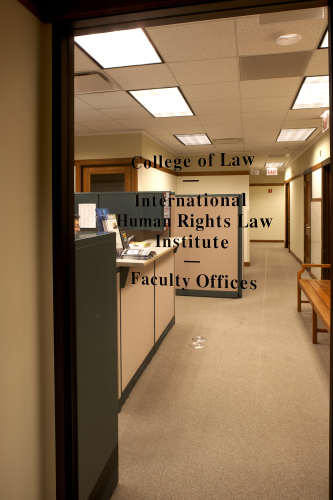Feb 09, 2010
Worldwide Conflicts, Victimization and Post-Conflict Justice Examined in New DePaul College of Law Study
Worldwide Conflicts, Victimization and Post-Conflict Justice Examined in New DePaul College of Law Study
The undertaking that would document the aftermath of 63 years of global conflict began with two questions: How many people were killed in wars and what happened to those who perpetrated human rights abuses during those conflicts? About 30 DePaul law students, working through the university’s International Human Rights Law Institute (IHRLI), set out to investigate the fate of human rights abusers involved in armed conflicts. Their work sparked a global study that examined worldwide conflicts, victimization and post-conflict justice. The results are contained in a newly released two-volume publication, titled “The Pursuit of International Criminal Justice: A World Study on Conflicts, Victimization, and Post-Conflict Justice.”
The two-year project, which studied clashes that took place around the world between 1945 and 2008, also examined post-conflict justice mechanisms that were applied in the wake of those encounters.
Some of the study’s findings are:
· Some 313 conflicts occurred globally between 1945 and 2008, resulting in the deaths of between 92 million and 101 million people. These include international and non-international conflicts as well as those that were purely internal, civil wars and regime victimization.
· Fewer than one percent of international crime perpetrators have been brought to justice. These selective prosecutions have taken place in only 53 of the 313 conflicts identified in the study, which represents 17 percent of the total number of conflicts. In contrast, amnesty laws were enacted in 126 of 313 conflicts identified, which means that in 40 percent of all conflicts, perpetrators have benefited from impunity.
· Since 1948, only 823 persons have been indicted by international and mixed model tribunals.
· Fifty-six truth commissions and other investigative bodies have been established, mostly in Latin America. Despite the well-known Truth and Reconciliation Commission of South Africa, the modality of post-conflict justice has been comparatively rare in Africa, as well as in Europe and Asia. In the Arab world, only Morocco and Israel have undertaken investigatory commissions.
· In only 16 of the 313 conflicts were some form of reparations for victims undertaken, involving fewer than 1 percent of the victims of conflicts. With the exception of some post-World War II victim compensation, there has been no other instance of monetary compensation for victims of other conflicts.
· By the end of the 20th century, the ratio of military to civilian victims had soared to, on average, 9,000- to-1, which was up from 1-to-1 during World War I.
“This is an unprecedented historical analysis of world conflicts,” said M. Cherif Bassiouni, president emeritus of IHRLI and one of the key architects and editors of the report. “More than 46 scholars from 18 countries were involved in the research, and another 628 experts from 86 nations reviewed the findings and made recommendations. This project’s findings and recommendations will help us learn from our past as we continue to strive for justice in post-conflict situations.”
The project addressed conflict victimization and post-conflict justice mechanisms geographically and thematically. The Arab world, the Americas, Africa, Asia and Europe comprised the geographic scope of the study. Themes consisted of international, national and mixed model prosecutions; truth commissions and other investigatory bodies; victims’ rights; lustration; apologies and amnesty laws.
Data were compiled from multiple sources, including established databases in the United States, Sweden, Netherlands and Switzerland. Reports from intergovernmental organizations, non-governmental organizations and the media also were used for the analysis.
IHRLI sponsored conferences around the globe where experts gathered to disseminate information and compile reports that would serve as the core of the project’s findings. DePaul law students, graduates and human rights experts worked with IHRLI to plan, execute and present and the conferences, which netted the bulk of the content for the project.
One of the tools that helped participating experts measure the effectiveness of post-conflict justice mechanisms was a guidebook created in 2008 by IHRLI; the Chicago Council on Global Affairs; the Syracuse, Italy-based International Institute of Higher Studies in Criminal Sciences, which Bassiouni directs; and the International Association of Penal Law, which is headquartered in Paris, France. The guidebook, titled “The Chicago Principles On Post-Conflict Justice,” is widely used by officials and practitioners involved in post-conflict reconciliation and international criminal accountability work.
“The project’s aim is to show the scope of challenges faced by international criminal justice and how the International Criminal Court must shape its mission and approach to address the high expectations made of it,” said Charles E. Tucker Jr., executive director of IHRLI. “This unique and far-reaching study should help achieve that goal.”
The project was funded by the European Union and was supported by the International Association of Penal Law, and the Irish Centre for Human Rights at the National University of Ireland and the International Institute of Higher Studies in Criminal Sciences.
IHRLI was founded at DePaul’s College of Law in 1990. It is known globally for its extensive human rights law research, training and advocacy. It has engaged in and supported this type of large-scale human rights documentation since its inception.
Note to Editors: For excerpts of the study contact T. J. Chernick at tchernic@depaul.edu.

